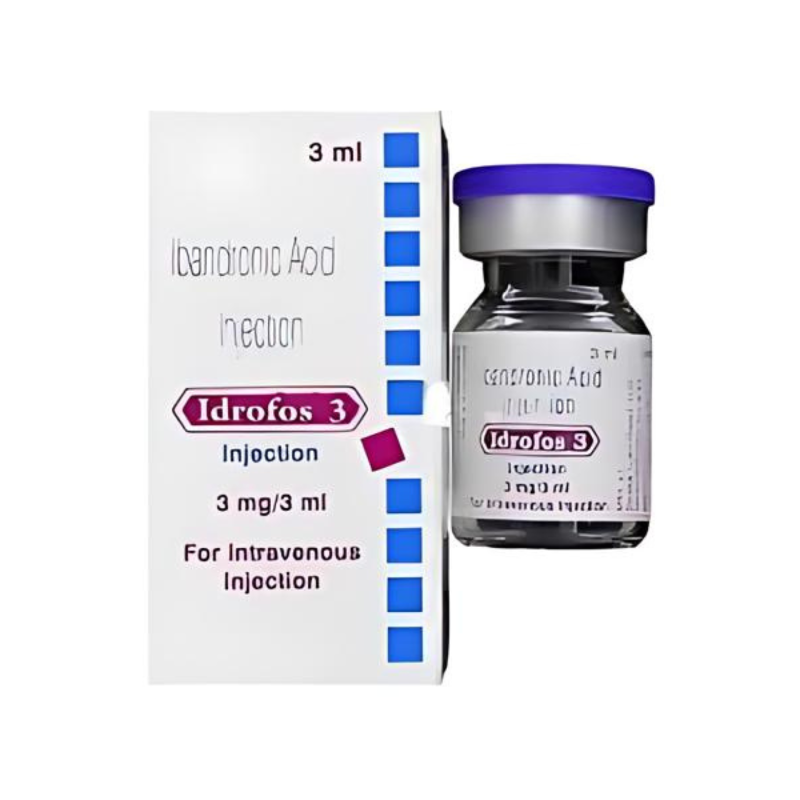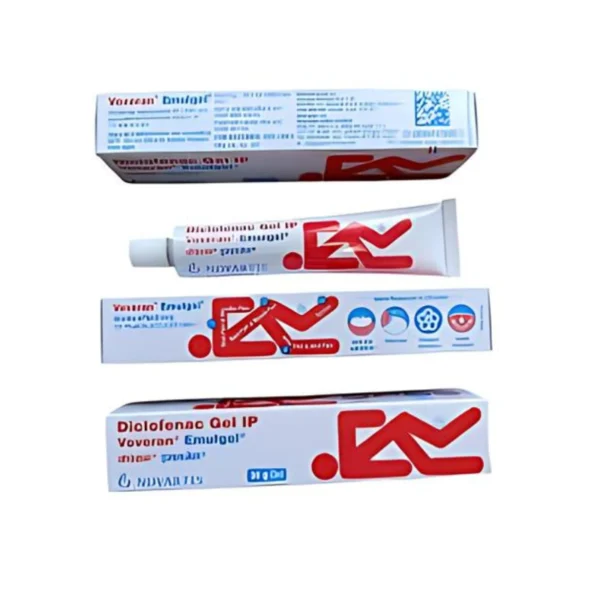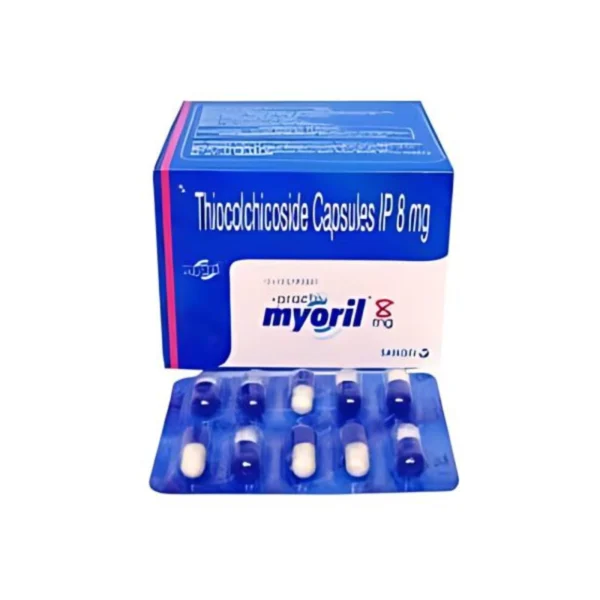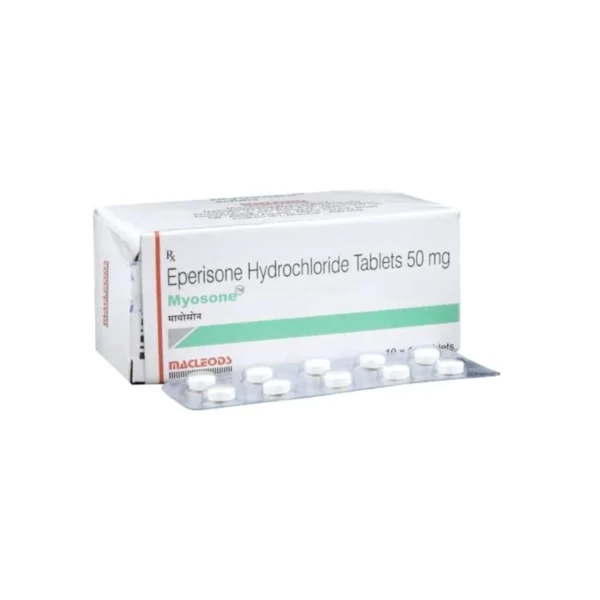FLAT 10% OFF ON YOUR FIRST ORDER. USE IVER10
Idrofos 3 mg Injection
Price range: $40.00 through $216.00
Idrofos 3 Injection is a prescription bisphosphonate containing Ibandronic Acid used to treat postmenopausal and steroid-induced osteoporosis, hypercalcemia of malignancy, and bone complications from metastatic cancers. This intravenous treatment works by inhibiting osteoclast activity, reducing bone loss, and improving bone density to lower fracture risk. Typically administered by a healthcare professional every 3 months or annually, Idrofos 3 requires adequate hydration to prevent kidney issues. Common side effects include injection site discomfort, headache, and mild digestive upset. Serious but rare effects include kidney problems and jaw osteonecrosis. Patients should inform doctors about kidney function, calcium levels, and other medications to avoid interactions. Maintaining sufficient calcium and vitamin D intake alongside lifestyle measures like exercise is essential for optimal results. Consult your healthcare provider for personalized treatment plans.
- Buy 2 and get Flat 15% Off. Use B2SAVE15
- Buy 3 and get Flat 20% Off. Use B3SAVE20
Idrofos 3 Injection – For Osteoporosis & Hypercalcemia Treatment
Idrofos 3 Injection contains Ibandronic Acid, a bisphosphonate medication used in the treatment of:
- Osteoporosis (especially postmenopausal and steroid-induced)
- Hypercalcemia associated with cancer
- Bone damage due to metastasis from cancers such as breast cancer
It helps reduce the risk of fractures by preventing bone loss and strengthening the bone matrix.
Uses of Idrofos 3 Injection:
- Postmenopausal osteoporosis – treatment and prevention
- Osteoporosis induced by long-term steroid use
- Hypercalcemia of malignancy
- Bone complications in metastatic cancer
Benefits of Idrofos 3 Injection:
- Slows down bone resorption by inhibiting osteoclasts
- Maintains or increases bone mineral density (BMD)
- Decreases the risk of fractures in spine, hip, and other bones
- Reduces high calcium levels caused by cancer
- Single injection may last up to 12 months (depending on treatment plan)
How to Use Idrofos 3 Injection?
- Route: Intravenous (IV) injection
- Administration: Given by a trained healthcare professional only
- Pre-treatment hydration: Ensure adequate water intake to prevent kidney issues
- Dosage frequency: As advised by your doctor (usually every 3 months or annually)
Mechanism of Action:
It is a bisphosphonate. It binds to bone surfaces and inhibits the activity of osteoclasts (cells responsible for bone breakdown). This action:
- Reduces bone loss
- Improves bone mass and strength
- Lowers serum calcium in cancer-related hypercalcemia
Common Side Effects:
These are generally temporary and resolve on their own:
- Injection site pain, swelling, redness
- Headache
- Bone, muscle, or joint pain
- Heartburn
- Indigestion
- Diarrhea
Serious Side Effects (Seek Immediate Medical Attention):
- Severe kidney problems (especially in dehydrated patients or those on diuretics)
- Low blood calcium (hypocalcemia)
- Osteonecrosis of the jaw (pain, swelling, or infection in jaw)
- Esophageal irritation (rare, but possible)
Precautions:
- Do not use during pregnancy or breastfeeding unless prescribed
- Inform your doctor about existing kidney problems or low calcium levels
- Tell your doctor about any other medications being taken, including cancer or infection therapies
- Ensure adequate calcium and Vitamin D intake during treatment
Drug Interactions:
May interact with:
- Diuretics
- Calcium or magnesium supplements (timing should be spaced out)
- Drugs affecting renal function (e.g., aminoglycosides, NSAIDs)
Safety Advice:
| Condition | Advice |
|---|---|
| Alcohol | Use cautiously; may increase risk of bone loss or gastrointestinal issues |
| Pregnancy | Not recommended unless clearly needed |
| Breastfeeding | Consult your doctor – limited data available |
| Driving | Safe – no significant impact reported |
| Kidney | Use with caution in mild/moderate cases; avoid in severe renal impairment |
| Liver | Generally safe; no major dose adjustments required |
Missed Dose?
If a scheduled injection is missed, consult your doctor. Do not take a double dose. Continue with the regular schedule as advised.
FAQs:
What is Idrofos 3 Injection used for?
Used for osteoporosis, hypercalcemia, and to manage bone damage from metastatic cancer.
How is it administered?
Intravenously by a doctor or nurse. Not for self-injection.
Can I take calcium supplements with Idrofos 3 Injection?
Yes, calcium and Vitamin D are often prescribed alongside. Follow your doctor’s dosage instructions.
How long does one Idrofos 3 injection last?
It varies by indication: may be administered once every 3 months or annually.
What lifestyle changes can enhance the effect of Idrofos 3 Injection?
-
- Regular weight-bearing exercises
- Quit smoking and reduce alcohol
- Balanced diet rich in calcium and Vitamin D
- Sunlight exposure for natural Vitamin D
Is it safe for long-term use?
Yes, if monitored regularly. Long-term safety depends on periodic assessment of kidney function, calcium levels, and bone density.
| Pack Size | 1 Injection, 3 Injection, 6 Injection |
|---|










Reviews
There are no reviews yet.